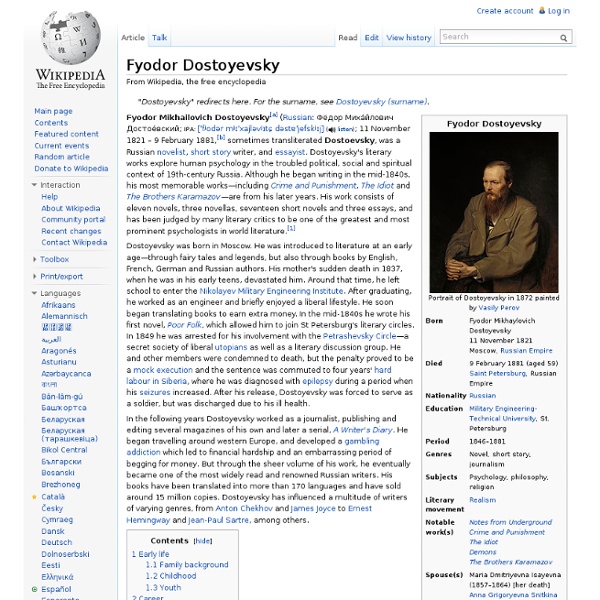



Alexander Pushkin Alexander Sergeyevich Pushkin (Russian: Алекса́ндр Серге́евич Пу́шкин, tr. Aleksandr Sergeyevich Pushkin, IPA: [ɐlʲɪˈksandr sʲɪˈrɡʲejɪvʲɪt͡ɕ ˈpuʂkʲɪn] ( ); 6 June [O.S. 26 May] 1799 – 10 February [O.S. 29 January] 1837) was a Russian author of the Romantic era[1] who is considered by many to be the greatest Russian poet[2][3][4][5] and the founder of modern Russian literature.[6][7] Pushkin was born into Russian nobility in Moscow. His great-grandfather from his mother's side – Abram Gannibal – was brought over as a slave from Africa and had risen to become an aristocrat.[8] Pushkin published his first poem at the age of fifteen, and was widely recognized by the literary establishment by the time of his graduation from the Tsarskoye Selo Lyceum. Notoriously touchy about his honour, Pushkin fought as many as twenty-nine duels, and was fatally wounded in such an encounter with Georges-Charles de Heeckeren d'Anthès. Life and career[edit] Georges d'Anthès Pushkin descendants[edit] Legacy[edit]
The "Conversion" of Leo Tolstoy. In the late 1870s Count Leo Tolstoy (1828-1910), author of the great novels War and Peace and Anna Karenina, underwent a severe inward crisis. His life, the existence of all mankind and the universe, seemed completely futile to him. He overcame his despondency by thinking his way through to a religion of "the infinite" as God, and morality demanding simplicity of daily life, non-violence, and the abolition of government, church, science and industry. He spoke of this development as his conversion. However, his extensive diaries kept between 1847 and his death, and his Confession, the record of his crisis and conversion, show that both before and afterwards his all but exclusive and obsessive concern was with his own self. Let us observe Tolstoy's crisis and "conversion" in detail through his Confession. He says this was usual among educated people, for whom "religious doctrine [was only] an external phenomenon disconnected from life[1]." Then his inward crisis began.
Tito–Stalin split The Tito–Stalin Split was a conflict between the leaders of SFR Yugoslavia and the Soviet Union (USSR), which resulted in Yugoslavia's expulsion from the Communist Information Bureau (Cominform) in 1948. This was the beginning of the Informbiro Period, marked by poor relations with the USSR, that came to an end in 1955. It was said by the Soviets to be caused by Yugoslavia's disloyalty to the USSR, while in Yugoslavia and the West it was presented as Josip Broz Tito's national pride and refusal to submit to Joseph Stalin's will in making Yugoslavia a Soviet satellite state. Origins[edit] The two conflicting leaders of the Jugoslavia-USSR split During the Second World War, the country was occupied by the Axis and developed a significant force of Yugoslav Partisans. In the immediate aftermath of World War II, there occurred several armed incidents between Yugoslavia and the Western Allies. First Cominform[edit] However, the world still saw the two countries as the closest of allies.
Alexandra Kollontai Alexandra Mikhailovna Kollontai (Ukrainian: Олександра Михайлівна Коллонтай, Russian: Алекса́ндра Миха́йловна Коллонта́й — née Domontovich, Домонто́вич) (March 31 [O.S. March 19] 1872 – March 9, 1952) was a Russian Communist revolutionary, first as a member of the Mensheviks, then from 1914 on as a Bolshevik. In 1923, Kollontai was appointed Soviet Ambassador to Norway. Kollontai, probably before 1900 Biography[edit] Early life[edit] Alexandra Mikhailovna Domontovich was born on March 31 [O.S. Alexandra Mikhailovna – or "Shura" as she was called growing up – was close to her father, with whom she shared an analytical bent and an interest in history and politics. "My mother and the English nanny who reared me were demanding. Alexandra was a good student growing up, sharing her father's interest in history, and mastering a range of languages. "You work! Revolutionary activities[edit] With the onset of World War I Kollontai left Germany due to the German social democrats’ support of the war.